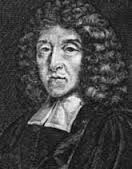Men of God
Francis Turretin Index
Click Here for Articles by Francis Turretin
Francis Turretin (17 October 1623 – 28 September 1687; also known as François Turretini and Francis Turrettin) was a Swiss-Italian Reformed scholastic theologian.
Turretin is especially known as a zealous opponent of the theology of the Academy of Saumur (embodied by Moise Amyraut and called Amyraldianism), as an earnest defender of the Calvinistic orthodoxy represented by the Synod of Dort, and as one of the authors of the Helvetic Consensus, which defended the formulation of double predestination from the Synod of Dort and the verbal inspiration of the Bible.
He was the grandson of Francesco Turrettini, who left his native Lucca in 1574 and settled in Geneva in 1592. Francis was born to Benoit Turretin[citation needed] at Geneva on October 17, 1623 and died there on September 28, 1687. He studied theology at Geneva (1640-1644), Leiden (1644), Utrecht, Paris (1645-1646), Saumur (1646-1648),[1] Montauban, and Nîmes.[citation needed] In Paris he also studied philosophy under Roman Catholic Pierre Gassendi. Returning to his native city, he was made pastor of the Italian church there from 1648 to 1687, of the French congregation from 1653-1687, and professor of theology at the Academy of Geneva in 1653.[1] He is the father of Jean Alphonse Turretin, who would do much to dismantle the theology his father promoted.[2]
His Institutio Theologiae Elencticae (3 parts, Geneva, 1679–1685) was the culmination of Reformed scholasticism. The Institutes uses the scholastic method to dispute a number of controversial issues. In it he defended the view that the Bible is God’s verbally inspired word, though he believed it may err on minor historical matters. He also argued for infralapsarianism and federal theology. The Institutes was widely used as a textbook, up to its use at Princeton Theological Seminary by the Princeton theologians only to be replaced by Charles Hodge‘s Systematic Theology in the late 19th century. Of his other disputations, his most important are De Satisfactione Christi disputationes (1666) and De necessaria secessione nostra ab Ecclesia Romana et impossibili cum ea syncretismo (published in 1687). He wrote the Helvetic Consensus, a Reformed confession written against Amyraldianism, with J. H. Heidegger in 1675.[2]
Taken from Wikipedia: Francis Turretin

